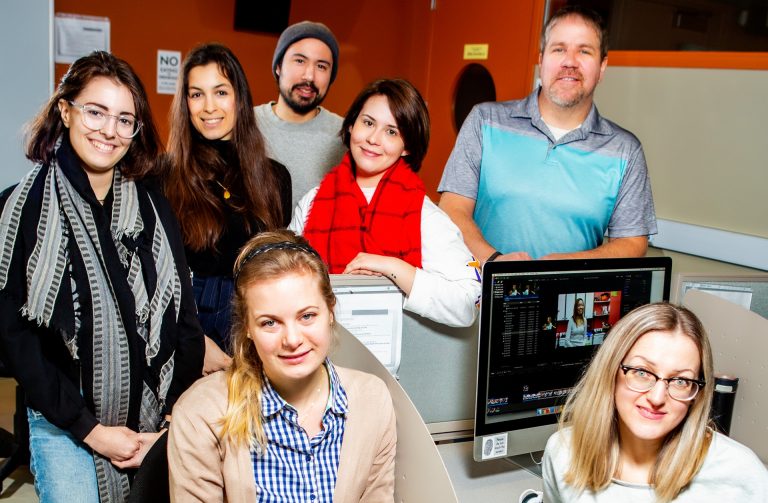Concordia’s Department of Journalism moves deeper into Indigenous studies

Recent RCMP raids of Wet’suwet’en territory and the widespread responses that followed have made headlines across Canada and beyond. But many supporters of the land defenders in Northern British Columbia have called out media bias and misrepresentation of the increasingly polarizing situation.
Students in Concordia’s Department of Journalism now have the opportunity to explore the ethics of reporting in and about Indigenous communities, thanks to a new course on the subject. Indigenous Journalism (JOUR 498) tackles sensitive topics and the ways in which Indigenous journalism differs from the mainstream.
The course was developed by Steve Bonspiel, a part-time journalism faculty member and former journalist-in-residence at Concordia. He is also editor and publisher of the Kahnawake-based community newspaper, The Eastern Door.
“I always thought it was really important to have some kind of Indigenous class,” Bonspiel says.
“I think the time was right. The goal is to inspire other students to take this class and open their minds.”
Bonspiel first came to Concordia when he was selected as the journalist-in-residence for the winter 2018 term. He led a pilot course that focused on the Mohawk language — Kanien’kéha.
“Living the Language: The Mohawk Revival,” a multimedia project created by journalism students alongside Bonspiel, emerged from that course and garnered local media attention.
After the success of the pilot, Bonspiel decided to propose a final year Indigenous journalism class to department chair David Secko, who supported the idea and gave him the freedom to start creating the class as part of his journalist-in-residence activities.
“The department was very lucky to have Steve join us as a journalist-in-residence in 2018,” Secko says.
“His hard work, pilot class with journalism students and experience with The Eastern Door all culminated in a much-needed, new Indigenous journalism class. Before we could even alert students that it was being offered, they found it and started signing up.”
‘There’s a lot of stuff to unpack and unravel’
“This class says to students that this is now part of your education, and I think this is a great move by Concordia,” Bonspiel says.
After he submitted the outline for the class, it was accepted for the winter 2020 term.
“The truth is, it’s a process,” he says. “There’s a lot to go through but once you get to the end, it feels like, ‘Wow, we did it.’”
During the course, students report on local Indigenous communities and learn how to find stories and familiarize themselves with the people on the ground.
“The best part of journalism is that you can make a plan, but the reality is things change. Our class ran with it, kind of like breaking news,” Bonspiel adds.
He emphasizes that students don’t have to understand years of history to enter this class — they just need to keep an open mind and understand the concerns of Indigenous communities.
“There’s a lot of stuff to unpack and unravel when teaching Indigenous journalism,” he notes.
“Students aren’t expected to know it all. I just tell them to be critical thinkers and have patience. It’s important to teach students this because then the mistakes of the past won’t keep happening.”
The course also prepares students on how to report in Indigenous communities and how to take into consideration different protocols before entering into one.
‘This information isn’t just for journalists, but for everyone’
“You can’t know the history of Canada without knowing our history,” Bonspiel points out.
“I think people need to understand the land they live on is not theirs and there’s a much deeper history that people need to educate themselves about.”
Bonspiel emphasizes that journalists should have this knowledge because it will make them well-rounded reporters.
“But I remind students that this information isn’t just for journalists, it’s for everyone,” he adds.
“I tell them not to forget what they learn in this class because this information will be valuable no matter what they do, and they can also help educate others.”
Bonspiel hopes this class, now halfway into the term, will continue to be offered in the future.
“The department is dedicated to helping support students engage with approaches to Indigenous journalism and is excited to see their work in this area. The goal is to continue to offer and improve this course each year,” says Secko.
Bonspiel is hopeful for the future and says this class goes beyond him and should remain part of Concordia.
“Our concerns are very similar to the concerns of other people — we are people who want clean drinking water and to not have mouldy houses,” he says.
“It starts with building relationships, getting to know us more, visiting the community firsthand. If there’s one thing I hope students take from this class, it’s that there’s another world out there — the Indigenous world.”
Learn more about Concordia's Department of Journalism.




